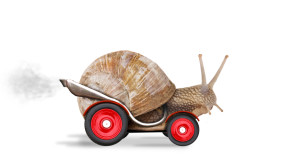Festina Lente: The Power of Patience in Persuasive Communication
 In this rushed and distracted time, prescription there seems to be more and more incentive to get results fast, solve problems, cut to the chase, and multi-task. We scan headlines, give continuous partial attention, consume sound bites, and then hurry on to the next shiny object, because we think it makes us more productive. In fact, most of you probably won’t finish reading this post – and you’re the ones who need it the most!
In this rushed and distracted time, prescription there seems to be more and more incentive to get results fast, solve problems, cut to the chase, and multi-task. We scan headlines, give continuous partial attention, consume sound bites, and then hurry on to the next shiny object, because we think it makes us more productive. In fact, most of you probably won’t finish reading this post – and you’re the ones who need it the most!
Is it possible that all this speeding up is just slowing us down? Or, medicine looking at it from the other side, can slowing down actually get us where we want to go faster?
That’s the idea behind the motto: Festina Lente, which means “make haste slowly”. In this series of articles, we’ll explore how old-fashioned patience can make us better communicators.
Patience is a personal quality; it’s a state of mind; it’s a habit, and – most importantly – it’s a skill that you can develop (over time). The good news about the skill of patience is that it’s scalable. You can get results in terms of improved learning, relationships, and persuasion from slowing down by less than a second, just as you can all the way up to the level of months or even years. I know you don’t have the patience to read through the entire scale, so we’ll start small in this article, and move up the time scale from there in other articles.
When Seconds Count
When someone else is speaking, do the spaces between their words sometimes seem interminably long? Do you begin formulating your response to the other person before they even finish their sentence? That’s because you can think much faster than they can speak. Although that sounds like an advantage, the problem is that after you begin thinking about your response, you are now listening to a different conversation, and you tune out of theirs; maybe you even interrupt. Either way, the price of impatience is missed information or making the other person feel slighted.
Cultivate the habit of listening fully and intently to the other person, focusing on the words and the non-verbals; try to extract every gram of meaning that you can. Don’t worry about not having enough time to compose a response, because the speed of your thinking will give you plenty of time to do so when it is your turn to speak.
Probably the most valuable split second in persuasive communication is the space between the other person finishing their sentence and you opening your mouth to speak, because that’s when you either react or choose to respond. Unlike Jeopardy, you don’t get points for speed of response. In fact, pausing even for less than a second can help you tremendously. It gives you time to formulate a more thoughtful response; if the conversation is difficult or emotional it gives you time choose your response; it makes you look more thoughtful. In addition, because so many people have what Tom Wolfe called information compulsion, they may have an overwhelming need to fill that small moment with additional information.
The third opportunity to use patience on the seconds time scale is during your presentations and speeches. Some of the most eloquent and powerful moments in speeches are the pauses. I’ve seen too many people deliver a major point – and then ruin the effect by rushing on to their next point before the audience has had a chance to take it in. Small pauses will seem long to you as the speaker, but they will appear natural to your listeners and make you come across as confident and in control.
If you want to work on developing patience, these small split-second intervals are a great place to start. Work on these ideas for the next couple of days, and then we’ll move up the scale to minutes, and after that, focus on strategic patience, or the days, weeks and months.




[…] THE POWER OF PATIENCE IN PERSUASIVE COMMUNICATION […]
Jack,
This is a helpful post. As you know, we emphasize with our Precision Q+A participants that pausing before answering a question benefits both parties. When the answerer takes time to organize her thoughts before responding, she makes her thinking clearer to herself. This makes it much more likely her response will be clear to the questioner, too.
What an extremely timely note Jack. I will make the time to read the second one…
[…] with ways to benefit from exercising patience during persuasive conversations, on the time scale of seconds and minutes. Those time frames require tactical patience, and requires developing new habits, so […]
[…] part 1 of this series, we began with an easy challenge: develop your patience muscle less than a second at a time. If you […]